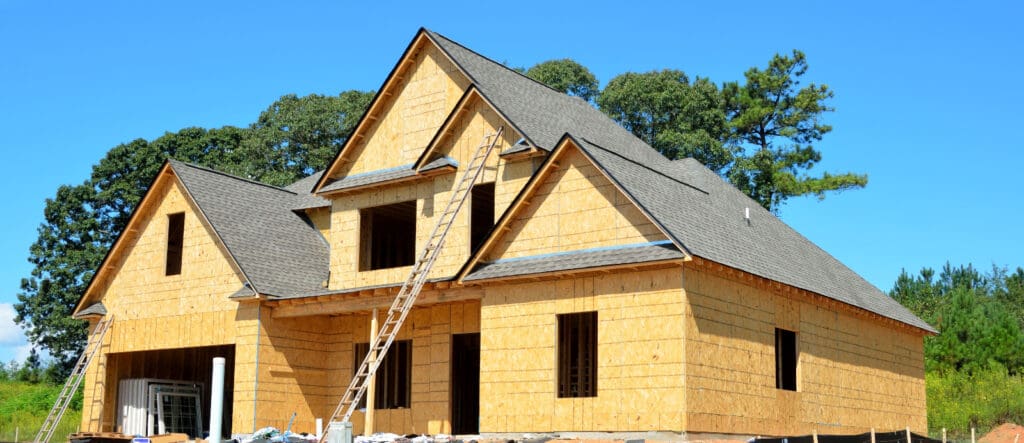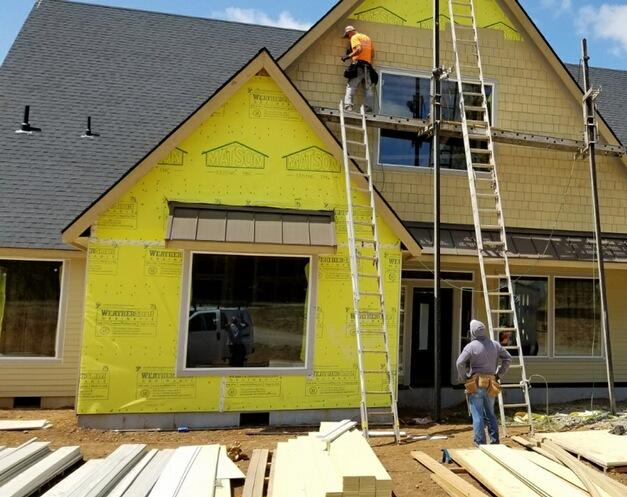
Updated on January 23, 2026
There are a lot of options when choosing a new roof, including style, color, and materials. Synthetic composite roofing is becoming a favorite of homeowners because of its combination of form and function. But what is synthetic composite roofing, and what makes it so appealing?
Synthetic composite roofing is a type of advanced roofing material engineered to replicate the appearance of natural products—such as cedar shake, natural slate, or clay tiles—using modern, high-performance components. These roofing materials are manufactured from a blend of recycled materials, polymers, and resins designed to withstand the elements while offering the classic look of traditional roofing.
Unlike roofing systems made solely from natural materials, synthetic roofing materials are built to be more durable, environmentally friendly, and easier to maintain. Composite shingles often look remarkably similar to asphalt shingles, slate, or cedar shake, but they tend to outperform them in key areas like longevity, impact resistance, and fire ratings.
Is All Composite Roofing Synthetic?
In most cases, yes—but the term “composite” simply means “made from more than one material.” So while most modern composite roofing products are synthetic (man-made), not all composites are entirely synthetic. Some may use natural fillers like wood fiber or rubber blended with plastic resins.
That said, when homeowners refer to composite roofing today, they typically mean synthetic composite shingles made to look like slate or cedar, not traditional multi-material systems or organic-based products. These modern shingles are engineered for performance, fire resistance, and long-term durability.
What Are Composite Shingles Made Of?
Composite shingles can vary slightly by manufacturer, but they generally consist of:
- Recycled materials like post-industrial plastics or rubber
- UV stabilizers to protect against sun damage
- Colorants and granules for aesthetic appeal
- Molded patterns that mimic wood shake shingles, asphalt shingles, or natural slate
This engineered design allows for realistic-looking shingles that resist fading, cracking, curling, and moisture damage better than many natural or traditional roofing materials.
How Long Does Synthetic Composite Roofing Last?

Many synthetic composite shingles are designed to last up to 50 years or more, depending on the specific product and the quality of installation. That makes them one of the most long-lasting roofing options available—especially when compared to asphalt shingles, which typically last 15 to 30 years, or cedar shake, which may need replacing after 20 to 40 years, depending on climate and maintenance.
Composite roofing materials also resist many of the issues that shorten the lifespan of traditional roofs, such as rot, mold, insect damage, and UV degradation.
How Does It Compare to Other Roofing Materials?
When evaluating synthetic composite roofing vs. other materials, it helps to look at several factors: lifespan, appearance, environmental impact, and maintenance needs.
Cedar Shake:
Cedar shake roofs are admired for their rustic appearance, but they require frequent maintenance and are more vulnerable to fire, moss growth, and decay. Composite shake shingles offer the same aesthetic without the upkeep or fire risk.
Asphalt Shingles:
Asphalt shingles are the most common roofing material in the U.S. due to their low upfront cost. However, they wear out faster, are less eco friendly, and don’t hold up as well in extreme weather compared to composite shingles.
Metal Roofing:
Metal roofs are extremely durable and energy-efficient but can be more expensive and less visually compatible with traditional home styles. Composite roofing bridges the gap between performance and curb appeal.
Slate or Clay Tiles:
While beautiful and long-lasting, real slate or clay tiles are heavy, costly, and often require structural reinforcement. Synthetic composite versions are significantly lighter and easier to install, with similar visual impact.
How Environmentally Friendly Are Composite Roofing Materials?
One of the key benefits of synthetic roofing materials is their eco-friendly design. Most composite shingles are manufactured using recycled materials and are themselves recyclable at the end of their lifespan. By mimicking natural materials like slate or cedar without harvesting forests or mining stone, these shingles reduce environmental strain while offering superior performance.
Choosing composite roofing can also improve your home’s energy efficiency. Many products include reflective granules or insulation-enhancing properties that help regulate indoor temperature and reduce HVAC usage.
Are Composite Roofs Fire-Resistant?
Yes—fire resistance is one of the major advantages of composite roofing systems. Many synthetic shingles come with Class A fire ratings, which is the highest rating available. This makes them a safer alternative to untreated cedar shakes or aging asphalt shingles, especially in wildfire-prone areas.
Always check the fire ratings of the specific product you’re considering. Warner Roofing helps homeowners understand these classifications so they can make an informed decision.
How Much Maintenance Does Synthetic Composite Roofing Require?
One of the main reasons homeowners choose synthetic composite roofing is the low maintenance it offers. Unlike wood shake, which can crack, curl, or attract moss and insects, composite shingles are built to resist all of those issues. And unlike natural slate, which can chip or break, synthetic slate resists impact from hail and debris.

General maintenance includes:
- Periodic inspections (especially after major storms)
- Cleaning gutters and downspouts
- Occasional gentle cleaning to remove debris or algae
With these basic steps, most homeowners find their composite roof requires far less attention than other types of roofing.
What Are the Pros and Cons of Composite Roofing?
Pros:
- Long lifespan (up to 50 years)
- Fire resistance (often Class A)
- Low maintenance
- Lightweight and easy to install
- Eco friendly and made from recycled materials
- Realistic look of slate, cedar shake, or asphalt shingles
- Strong resistance to rot, insects, and UV rays
Cons:
- Higher upfront cost than asphalt
- Fewer installers may be experienced with high-end composite brands
- Some materials may fade slightly over time (depending on product quality)
Ultimately, the benefits outweigh the downsides for most homeowners looking for long-term value and curb appeal.
What to Consider Before Choosing Composite Roofing
If you’re thinking about installing a composite roof, here are a few important things to consider:
- Your climate: Composite roofs hold up well in a range of weather conditions, from hot summers to rainy winters.
- Home architecture: Whether you’re after the look of cedar shake or natural slate, composite products come in a variety of styles to match your home’s character.
- Longevity goals: If you’re planning to stay in your home for the long term, the 50-year lifespan offers excellent return on investment.
- Installer experience: A well-installed composite roof can last decades, but installation quality matters. Choose a company with experience and a strong track record—like Warner Roofing.
FAQs About Synthetic Composite Roofing
- Is composite roofing more expensive than asphalt shingles?
Yes, the initial cost is higher, but composite shingles last longer and require less maintenance—making them more cost-effective over time.
- Will synthetic shingles look fake?
Not at all. Modern composite shingles are crafted with incredible detail to mimic wood, slate, or clay tile. Many people can’t tell the difference from the ground.
- Can I walk on a composite roof?
Yes, but always do so carefully. While synthetic shingles are more impact-resistant than slate, it’s still best to limit foot traffic to protect the surface.
- Is composite roofing allowed by building codes?
Yes, most areas allow composite roofing, especially when the products meet UL testing and have proper fire ratings. Always check local codes or ask your roofing contractor.
- How do I know if composite roofing is right for me?
If you want a durable, low-maintenance roof with long-term performance and classic looks, composite is a great option. Warner Roofing offers free consultations to help you decide.
Trust Warner Roofing to Guide You Through the Process
At Warner Roofing & Construction, we take pride in helping homeowners find the best roofing system for their needs. If you’re considering synthetic composite roofing, we’ll walk you through the options, answer your questions honestly, and install your roof with the kind of craftsmanship and care we’re known for.
We’ve built our reputation on work that stands the test of time—and we’re here to help you protect your home with roofing materials built for the future.
Ready to explore composite roofing for your home? Contact Warner Roofing today for a free consultation and quote.